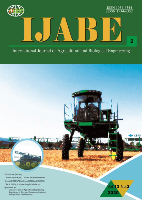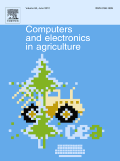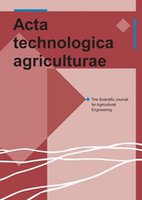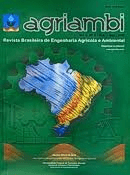
International Journal of Agricultural and Biological Engineering
Scope & Guideline
Connecting research and practice in agricultural engineering.
Introduction
Aims and Scopes
- Precision Agriculture Technologies:
Research in this area focuses on the development and optimization of technologies such as UAVs, sensors, and data analytics to improve crop management, yield prediction, and resource use efficiency. - Agricultural Machinery Design:
The journal covers the design, testing, and optimization of agricultural machinery, including seeders, harvesters, and irrigation systems, emphasizing innovations that enhance performance and reduce environmental impact. - Biological Engineering Applications:
This includes studies related to bioprocessing, bioenergy, and the utilization of biological materials in agriculture, focusing on sustainable practices and the development of bio-based products. - Environmental Impact Assessments:
Research assessing the effects of agricultural practices on soil, water, and air quality, including studies on nutrient management, waste recycling, and pollution control. - Smart Farming Solutions:
Exploration of IoT, AI, and machine learning applications in agriculture to enhance decision-making processes, automate operations, and optimize inputs.
Trending and Emerging
- Sustainable Agricultural Practices:
Research focusing on sustainability, including organic farming, agroecology, and regenerative practices, is gaining traction as global concerns about food security and environmental impact increase. - Data-Driven Agriculture:
The use of big data analytics, machine learning, and AI in agriculture is rapidly growing, with studies exploring how these technologies can enhance decision-making and operational efficiency. - Robotics and Automation in Agriculture:
There is a significant increase in research related to the design and implementation of robotic systems for tasks such as planting, harvesting, and monitoring crops, addressing labor shortages and efficiency. - Climate-Resilient Agriculture:
Emerging research focuses on developing agricultural practices and technologies that can withstand climate change impacts, including drought-resistant crops and adaptive management strategies. - Integrated Pest Management (IPM) Technologies:
The integration of innovative pest management strategies, including biological control and precision application methods, is trending as a response to pesticide resistance and environmental concerns.
Declining or Waning
- Traditional Farming Practices:
There is a noticeable decrease in research focusing on conventional farming techniques, as the emphasis has shifted towards precision agriculture and smart farming technologies. - Basic Soil Science Studies:
Research that primarily addresses fundamental soil science without a direct application to agricultural engineering or technology is becoming less common, as applied research is favored. - Static Irrigation Methods:
With the rise of advanced irrigation technologies, studies focusing on static or traditional irrigation methods are declining in relevance and publication frequency. - Chemical Fertilizer Applications:
Research centered solely on chemical fertilizers without exploring integrated nutrient management strategies or sustainable alternatives is seeing reduced attention. - General Agricultural Economics:
Topics focused on broad economic analyses of agriculture without direct ties to engineering applications are less frequently published, as interdisciplinary approaches gain traction.
Similar Journals

APPLIED ENGINEERING IN AGRICULTURE
Enhancing Productivity and Sustainability in Agriculture through Engineering Excellence.APPLIED ENGINEERING IN AGRICULTURE is a peer-reviewed journal published by the American Society of Agricultural and Biological Engineers, dedicated to advancing the field of agricultural engineering through the dissemination of high-quality research. With an ISSN of 0883-8542 and an e-ISSN of 1943-7838, this journal has been a key resource since its inception in 1985, serving as a vital platform for scholars and practitioners to share innovative ideas and practical solutions that enhance productivity and sustainability in agricultural practices. The journal is ranked in the Q3 category for Engineering (miscellaneous) as of 2023, and is positioned within the 43rd percentile of the general engineering rankings in Scopus. While not currently an open-access journal, APPLIED ENGINEERING IN AGRICULTURE remains crucial for researchers and professionals looking to explore diverse engineering solutions that address the complexities of modern agriculture, making it an invaluable resource for anyone committed to improving agricultural systems through engineering advancements.

SPANISH JOURNAL OF AGRICULTURAL RESEARCH
Advancing Agricultural Innovation for a Sustainable FutureThe Spanish Journal of Agricultural Research (ISSN: 1695-971X, E-ISSN: 2171-9292), published by the prestigious Consejo Superior Investigaciones Cientificas (CSIC), serves as a vital resource for those engaged in the fields of agronomy and crop science. Established as an Open Access journal since 2003, it aims to foster the dissemination of innovative research and practical applications related to agricultural practices and sustainability. With its Q3 category in Agronomy and Crop Science and a Scopus ranking of #224 out of 406, the journal provides an accessible platform for scholars to share valuable findings that enhance agricultural productivity and environmental stewardship. Covering research from 2006 to 2024, this journal continues to be instrumental for researchers, professionals, and students eager to remain at the forefront of agricultural science advancements.

INMATEH-Agricultural Engineering
Empowering the Future of Food Science through Engineering AdvancesINMATEH-Agricultural Engineering is a prominent journal dedicated to advancing the field of agricultural and engineering sciences. Published by the INST NATL CERCETARE in Romania, this journal serves as a vital platform for researchers, professionals, and students interested in the intersection of food science, industrial and manufacturing engineering, and mechanical engineering. With its ISSN 2068-4215 and E-ISSN 2068-2239, the journal has established a reputation for being a reputable source of innovative research. According to the 2023 Scopus rankings, it is positioned within Q3 for Food Science and Industrial and Manufacturing Engineering, and Q4 for Mechanical Engineering, reflecting its ongoing commitment to high-quality scholarship. The journal's open-access policy facilitates wide dissemination of its content, enabling researchers to share their findings without barriers. Covering a range of topics relevant to agricultural engineering, from technological advancements to sustainable practices, INMATEH aims to foster collaboration and knowledge exchange among the global academic community. Its convergence period from 2012 to 2024 signifies the journal’s growth and adaptability to emerging trends and challenges in the field.

NJAS-Impact in Agricultural and Life Sciences
Bridging gaps in agricultural and life sciences through collaborative insights.NJAS-Impact in Agricultural and Life Sciences is a pivotal open-access journal, published by Taylor & Francis Ltd, focusing on the interdisciplinary nexus between agricultural practices and life sciences. Anchored in the United Kingdom, this journal aims to provide a comprehensive platform for the dissemination of innovative research that addresses critical challenges in environmental sustainability, agricultural productivity, and biological advancements. With its inaugural issue dated from 2023 to 2024, NJAS prominently features the latest empirical studies, reviews, and theoretical contributions that enrich existing knowledge and provoke thought among researchers and practitioners alike. Although currently ranking within the lower percentiles across various Scopus categories, the journal aspires to establish itself as a significant contributor to the dialogue on agricultural and environmental sciences. As scholars in these fields seek to bridge the gaps in understanding, NJAS invites submission from diverse perspectives, underscoring the importance of collaborative knowledge-building in addressing the complexities of our changing global landscape.

Transactions of the ASABE
Unveiling cutting-edge discoveries in agricultural sciences.Transactions of the ASABE is a premier journal published by the American Society of Agricultural and Biological Engineers, specializing in innovative research and practical applications in the fields of agricultural and biological engineering. With an ISSN of 2151-0032 and E-ISSN 2151-0040, this journal has established a vital niche in disseminating high-quality scholarly content that addresses the complex challenges faced in agriculture and biological systems. The journal operates under an open access model, facilitating broad dissemination of research findings to a global audience. This commitment to accessibility is reflected in its coverage of diverse topics, including agriculture, soil science, food science, and environmental engineering. Although the journal's coverage in Scopus was discontinued in 2021, it once ranked among the top in its categories, indicating its significant contribution to advancing knowledge in these essential fields. Researchers, practitioners, and students are encouraged to engage with the Transactions of the ASABE to stay abreast of developments and foster collaboration in promoting sustainable engineering solutions.

AMA-Agricultural Mechanization in Asia Africa and Latin America
Elevating Agricultural Practices with Cutting-Edge ResearchAMA-Agricultural Mechanization in Asia Africa and Latin America is an esteemed journal published by the FARM MACHINERY INDUSTRIAL RESEARCH CORP, dedicated to advancing the field of agricultural mechanization. With a history spanning from 1982 to 2020, this journal has served as a pivotal platform for disseminating innovative research and insights related to agricultural practices and technologies across pivotal regions including Asia, Africa, and Latin America. Although the journal has ceased its coverage in Scopus, its contributions to the fields of Engineering and Agricultural and Biological Sciences remain significant, particularly for professionals and researchers focusing on agricultural engineering dynamics. While it operates under a traditional subscription model, the urgency of its content in mechanization solutions continues to aid in enhancing agricultural productivity and sustainability. Researchers and practitioners alike will find invaluable resources within its pages, reflecting the critical developments in the sector during the late 20th and early 21st centuries.

COMPUTERS AND ELECTRONICS IN AGRICULTURE
Transforming Agriculture Through TechnologyCOMPUTERS AND ELECTRONICS IN AGRICULTURE, published by Elsevier Science Ltd, is a premier interdisciplinary journal dedicated to the exploration and application of computing and electronic technologies within agricultural sciences. With an impressive impact factor reflected in its Q1 status across multiple categories, including Agronomy and Crop Science, Animal Science and Zoology, and Computer Science Applications, this journal stands out as a leading platform for advancing research in these critical fields. The journal's aims include fostering innovation and facilitating knowledge transfer between academia and industry by disseminating high-quality research that addresses the challenges of modern agriculture through technological solutions. For researchers, professionals, and students dedicated to enhancing agricultural productivity and sustainability, COMPUTERS AND ELECTRONICS IN AGRICULTURE serves as an essential resource, offering insights that push the boundaries of traditional practices while embracing the digital future of agriculture.

Acta Technologica Agriculturae
Exploring Innovations in Agricultural TechnologyActa Technologica Agriculturae is an esteemed open-access journal published by SCIENDO, based in Poland, focusing on the interdisciplinary fields of Agronomy and Crop Science, Mechanical Engineering, and Waste Management and Disposal. Established in 2013 as an open-access platform, it has garnered attention for its commitment to disseminating high-quality research that addresses contemporary challenges in agricultural technology and environmental sustainability. With a commendable 2023 ranking in Q2 for Agronomy and Crop Science and Q3 in both Mechanical Engineering and Waste Management, the journal serves as a crucial resource for researchers, professionals, and students alike, encouraging innovative approaches and solutions. The convergence of diverse studies published from 2015 to 2024 amplifies the journal's relevance in a rapidly evolving academic landscape. Access to the journal’s articles is freely available, fostering broader dissemination and engagement within the scientific community.

Revista Brasileira de Engenharia Agricola e Ambiental
Pioneering Research in Agricultural and Environmental SciencesRevista Brasileira de Engenharia Agricola e Ambiental, published by the Universidade Federal de Campina Grande, serves as a pivotal platform for researchers and professionals in the fields of agricultural and biological sciences, agronomy, and environmental engineering. With an open-access policy since 2000, this journal aims to foster global dissemination of innovative research and practices, ensuring that high-quality findings are accessible to all. Operating in Brazil, it holds notable rankings, including Q2 in the categories of Agricultural and Biological Sciences (miscellaneous) and Agronomy and Crop Science, indicating its strong academic impact and influence within these fields. As of 2023, it ranks #68 out of 193 in Agricultural and Biological Sciences and #188 out of 406 in Agronomy and Crop Science, representing its commitment to advancing scientific knowledge. The journal primarily focuses on publishing studies that address challenges in agricultural engineering and environmental sustainability, making it an essential read for students, researchers, and professionals who are dedicated to innovation and excellence in these dynamic fields.

International Journal of Plant Production
Connecting researchers to cultivate the future of plant science.International Journal of Plant Production, published by SPRINGER in Switzerland, serves as a leading platform for the dissemination of innovative research in the fields of Agronomy, Crop Science, and Plant Science. With an ISSN of 1735-6814 and an E-ISSN of 1735-8043, this journal has maintained its reputation by achieving a Q2 quartile ranking in both categories as of 2023, alongside notable Scopus rankings placing it in the top quartiles of its fields (Rank #105/516 and Rank #88/406, respectively). The journal's scope encompasses a wide array of topics vital to sustainable agriculture and plant production systems, making it a critical resource for researchers, professionals, and students striving for advancements in these disciplines. By fostering open scientific dialogue and supporting cutting-edge research, the International Journal of Plant Production is committed to contributing to the resolution of global food security challenges, enhancing agricultural practices, and promoting ecological sustainability.